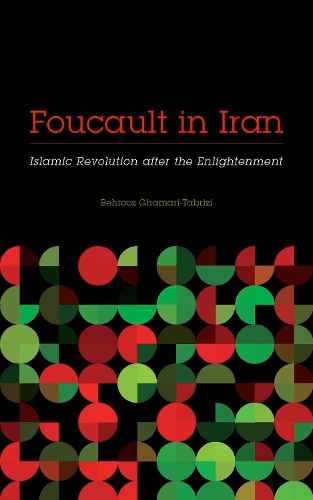
Foucault in Iran: Islamic Revolution after the Enlightenment
(Paperback)
Available Formats
Publishing Details
Foucault in Iran: Islamic Revolution after the Enlightenment
By (Author) Behrooz Ghamari-Tabrizi
University of Minnesota Press
University of Minnesota Press
15th October 2016
United States
Classifications
General
Non Fiction
Middle Eastern history
Social and political philosophy
Politics and government
955.0542
Physical Properties
Paperback
272
Width 140mm, Height 216mm
Description
Foucault in Iran centers on the significance of Foucault's writings on the Iranian Revolution and the profound mark it left on his lectures on ethics, spirituality, and fearless speech. This interdisciplinary work will spark a lively debate in its insistence that what informed Foucault's writing was his conviction that Enlightenment rationality has not closed the gate of unknown possibilities for human societies
Reviews
"Foucault in Iran is a courageous and thought-provoking invitation to understand the Iranian revolution, and Foucaults reaction to it, in an original way. A splendid work that goes beyond simple binaries, it has no sympathy for the clichd vocabulary used by Progressivists to describe these eventsor to criticize Foucault for his alleged romanticisation of the Iranian revolution."Talal Asad, City University of New York
"Foucault in Iran is absorbing and integral. Behrooz Ghamari-Tabrizi deftly situates his analysis within the currents of the protest movements that galvanized Iranians across wide ideological, economic, and class spectrums."Nasrin Rahimieh, University of California, Irvine
"Behrooz Ghamari-Tabrizi shows that the Iranian revolutionary movement was a socio-political source of creativity with historical significance. Foucault in Iran is a devastating critique of self-righteous Enlightenment rationality, and a must-read for anyone interested in Iranian political history, revolutionary action, and Foucaults later writings."Babak Rahimi, University of California, San Diego
"Through a meticulous presentation of events, reading, and engagement with Foucaults reportage, and the subsequent critiques of his writings on the topic, Foucault in Iran marvelously recaptures the unfolding unpredictability of the events and brings out vividly how this was a revolution without a known script, even to its participants."Afsaneh Najmabadi, Harvard University
"This book presents an intimate portrait of the events and conditions that led to the revolution, coupled with a fascinating account of Foucaults engagement with that moment. Historically rich and theoretically nuanced, Foucault in Iran advances a scathing critique of previous works on this subject that charged Foucault with having endorsed Islamist violence by supporting the revolution. This book offers a more complicated reading of Foucaults views on the revolution that disrupts binaries like secular/Islamist while also providing a riveting analysis on questions of time, history, and revolution."New Books Network
"Highly recommended, not only as a counter to Afary and Anderson (and many like-minded detractors of Foucault), but for all interested in Foucaults work in general."CHOICE
"Foucault in Iran is not simply a good work or even a brave one, it is a thoroughly necessary exemplar of contemporary academia. Every book should be this good."Hong Kong Review of Books
"An exemplary book for our time."SCTIW Reviews
"An impressively meticulous reading of Michel Foucaults writings on the events that preceded the overthrow of the Pahlavi monarchy in early 1979."Contemporary Political Theory
"It distinguishes itself foremost as a welcome provocation to Afary and Andersons labeling of Foucault as an unwitting, bad leftist."Milestones
"A significant critical work in the fields of Foucault studies, comparative revolutions, and political philosophy, Foucault in Iran has already become and will surely remain a must-read in these fields."Canadian Journal of History
Author Bio
Behrooz Ghamari-Tabrizi is associate professor of history, sociology, and Director of Center for South Asian and Middle Eastern Studies at the University of Illinois, Urbana-Champaign. He is the author of Islam and Dissent in Postrevolutionary Iran; Remembering Akbar: Inside the Iranian Revolution; and co-editor of The Iranian Revolution Turns 30.
